People from across the city of Plymouth have begun to install environmental sensors, known as Smart Citizen Kits, in their homes and businesses, to better understand their local environment as part of Plymouth College of Art’s Smart Citizens Programme. Assembled and coded by local participants using Arduino and Processing during a six-week training course led by the Smart Citizens Programme in Fab Lab Plymouth, these sensors capture environmental data such as air quality, noise pollution, humidity levels, CO2 levels and more. Six Smart Citizen Kits have now been installed in the homes and gardens of participants around the city, with a further eight soon to be added following another round of training later this month, creating a growing network of environmental sensors.
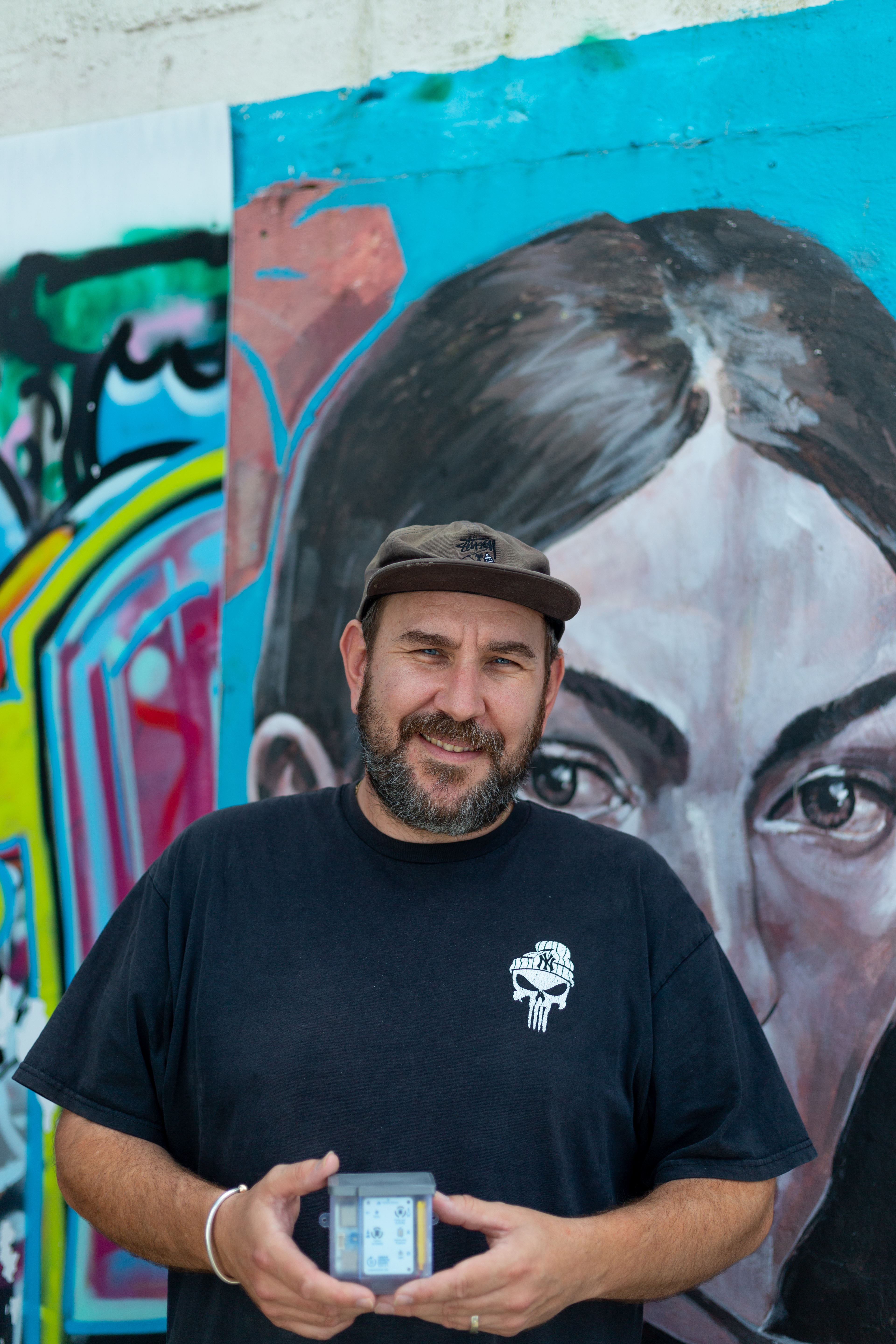
Local participant Nick Halford with his Smart Citizen Kit (Photo credit - Ray Goodwin)
Although sharing the same name as the Plymouth-based Smart Citizens Programme, the Smart Citizen Kit is an open source project developed by Fab Lab Barcelona. The project builds on open source technologies such as Arduino to enable individuals and communities from around the world to gather information about their environment and make it available to the public via the Smart Citizen platform. Sharing their data on this international platform, the Plymouth-based Smart Citizen Kits empower the local community to better understand and seek solutions to environmental issues within both a local and global context.
Local participant Tim Wornell, who works for the social housing provider Plymouth Community Homes, joined the free six-week training course at Plymouth College of Art. Tim said “The Smart Citizens’ training was really varied, combining elements including 3D printing, coding, electronics, environmental awareness; something to inspire everyone!
“In particular I enjoyed learning how to fetch sensor data from an Application Programming Interface (API) and construct code to make a visual dashboard for interpreting the data. I also enjoyed learning about the environmental conditions and pollutants that the Smart Citizen Kits record.
“My experience of this training has helped me in a recent job application and interview, and I have used the skills I have developed since the course as part of an application to a funded Open University course.
“Since installing the sensor in my home I have regularly checked the data, looking for trends and patterns. Being able to compare with kits located all over the world gives an insight into how much local conditions can vary. For instance, I have compared the noise readings from the kit in my back garden to those from a kit in London - let's just say I am glad I don't live in London!
“It feels rewarding to contribute to a project as part of a group. I feel proud to support the Smart Citizen initiatives, especially because they are raising people's interest in, and awareness of, their environment, and the impact of human activity on their environment.”

(Left) Local participant Tim Wornell with his Smart Citizen Kit (Photo credit - Ray Goodwin)
(Right) Tim Wornell’s Smart Citizen Kit installed on a birdhouse (Photo credit - Ray Goodwin)
Work is currently ongoing to collate the local Smart Citizen Kit data with existing environmental data generated by other Plymouth organisations, such as the University of Plymouth, The Data Place and the Plymouth City Council-led Green Minds project, to explore how it can be used to empower local people and support decision-making processes for planning across the city.
Locally Made, Globally Connected
The creation of these sensors marks the Smart Citizens Programme’s ongoing commitment to the Fab City initiative, which champions cities to make locally following circular economy principles, whilst encouraging global knowledge sharing between cities.
Celebrating Plymouth as the first Fab City in the UK, the Smart Citizens Programme will be hosting a Fab City Plymouth Open Day on Wednesday 22 September, from 12pm to 6pm. This free drop-in event will see 13 Fab City hubs across the city opening their doors with a range of hands-on activities, demonstrations, business support and tours. From beekeeping and sustainable food production to digital manufacturing techniques, the Open Day celebrates how people across Plymouth are working towards creating a more sustainable and collaborative city, following the Fab City principles. Learn more about the Fab City Plymouth Open Day here.
Plymouth’s Innovative Spirit
Showcasing Plymouth’s innovative spirit, the Smart Citizens Programme added their own unique additions to the international Smart Citizen Kit. A waterproof case for the sensor was custom-designed by the Fab Lab Plymouth team and 3D printed, allowing it to be located outside in all weathers and customised by local participants. The waterproof case model will also be shared as an open source design, accessible to people around the world.
Local electronics expert Lee Nutbean, who led the six-week training, also developed a custom-coded online platform representing the local environment (such as sky, sun, clouds, rain, hills) with participants specifically for the Plymouth-based sensors. Through this platform, created using the open source software Processing, data such as light, humidity and pollution levels are collated and visualised within an illustrated, easily accessible and interactive dashboard to generate a real-time emulation of source locations. This custom and creative online platform will be showcased at the Fulldome UK festival, taking place from 8-10 October 2021 at the new Devonport Market Hall state-of-the-art immersive dome.
Local maker, Gary Hannaford, is a keen supporter of the Smart Citizens Programme. Creating his own sensor in the six-week Smart Citizen Kit course, Gary said, “I followed my father into toolmaking but left the trade due to medical problems. It is a trade I miss deeply and probably what drives me towards being a maker. The Smart Citizens Programme has been a godsend for me. It has fueled my desire to make and given me the tools to do so.”
“The Smart Citizen Kit training has been great; I am inspired to delve into this world a little deeper now I understand it better. I loved assembling the environmental sensor and enjoyed being involved with Lee’s artwork that uses its data. This boosted my Arduino knowledge, which before the Smart Citizens Programme was limited to making a GPS Speedo to someone else’s design.”
“Having a Smart Citizen sensor at my home that publishes data for others to use is brilliant. I check the outputs frequently to monitor what’s happening around me and I’m even considering expanding the station and adding a weather monitoring system to run alongside the environmental monitor.”

(Left) Local participant Gary Hannaford and his Smart Citizen Kit (Photo credit - Ray Goodwin)
(Right) Gary Hannaford demonstrates how data from his sensor is shared on the international Smart Citizen online platform (Photo credit - Ray Goodwin)
Opening up the world of electronics and coding
The Smart Citizens Programme’s six-week training not only provided an opportunity to develop electronics and coding skills but supported participants to understand how these skills could be combined with digital fabrication to create smart objects with real-world impacts, such as environmental monitoring.
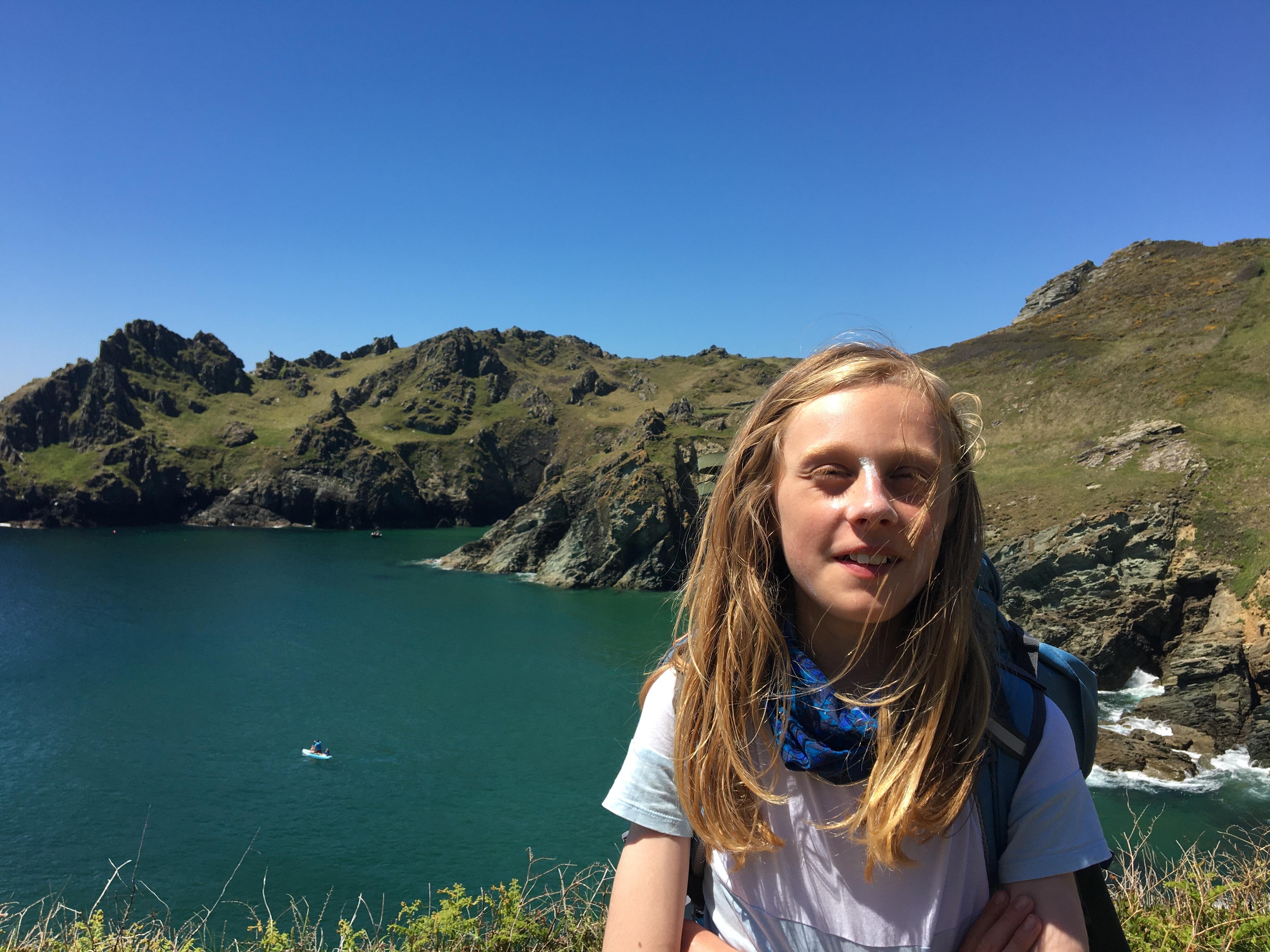
Local participant, Noa Bailey who took part in the Smart Citizens Programme’s six-week training
Through the Smart Citizens’ training Noa Bailey, aged 12, took his first steps into the world of electronics and coding. Noa said “I really enjoyed the course and learnt so much, including coding and processing script, electronics and 3D printing.
“It was amazing to produce something that can monitor the environment around it and create a digital landscape that shows this. I can’t wait to do the next Smart Citizens course and develop my skills in coding and electronics.”
Liz Bailey, Noa’s mum also added “He is so proud of the kit he has made and is looking forward to taking environmental recordings and viewing them digitally. This is a wonderful opportunity and we feel so fortunate to have the Smart Citizens Programme’s amazing facility on our doorstep.”
Another local participant Gareth Evans found his passion for programming renewed through the Smart Citizens’ training. Gareth, a Qualified Civil Engineer, said, “I would definitely recommend this course. Plymouth College of Art’s Smart Citizens Programme appears to be the only place locally offering technology focused training of this type and the variety of courses and workshops available for free offer something for all ages and abilities.”
“The six-week training rekindled my interest in programming - I have a 30-year-old A-level in Computing! It has developed my knowledge of coding and has pushed me to try new things. I’ve been inspired to develop a Raspberry PI touchscreen dashboard showing information from my sensors.”
“As an engineer, who relies on data to make decisions, I understand how useful it is to gather genuine data about the local environment. I can see many uses for these Kits, including potentially a day where they could be installed close to construction projects to monitor the impact of the project on local residents. I’m a big believer in the benefits of ‘big data’ so it has been great to be able to contribute towards this initiative.”
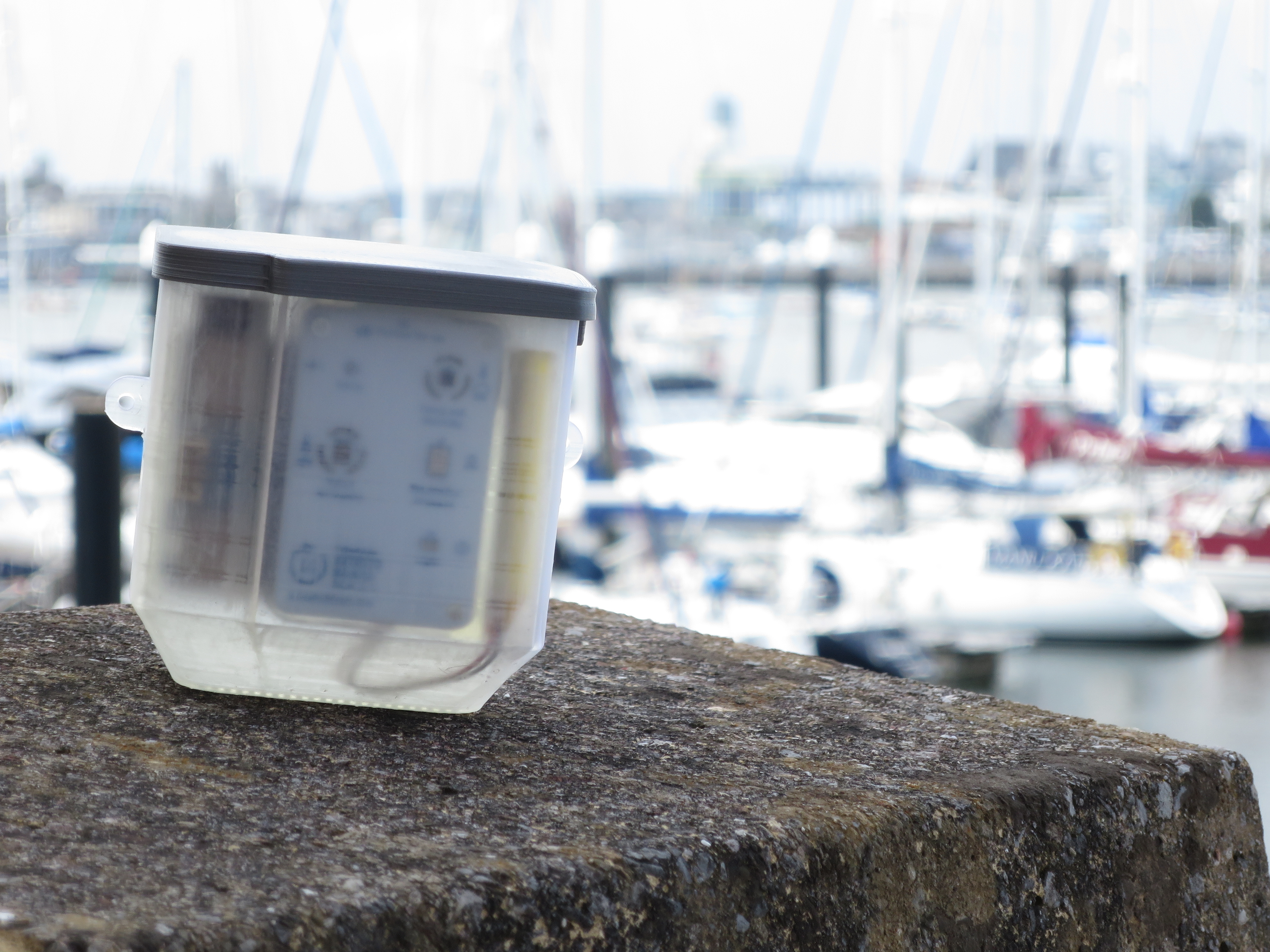
Smart Citizen Kit sensor created by Gareth Evans (Photo credit - Gareth Evans)
View data captured by kits around the world on the Smart Citizen platform.
This activity is part of the iMayflower project and has been supported by The Department for Digital, Culture, Media and Sport, who fund the Cultural Development Fund, which is administered by Arts Council England.
Digitally fabricated signs designed by local creatives in a workshop led by Plymouth College of Art’s Smart Citizens Programme have been installed in wildflower meadows across Plymouth, celebrating and protecting these important areas of urban re-wilding. Co-hosted by Plymouth City Council’s Green Minds project, who are leading a number of re-wilding activities across Plymouth, the workshop supported participants to combine new computer aided design (CAD) skills with their creative talents to design nature-inspired signs. The signs were then laser cut at Fab Lab Plymouth and installed in 24 locations around the city.
During the workshop, students, young people and members of local businesses developed new skills in digital design, learning about the process of laser cutting and how to use the 2D design software, ‘Inkscape’. Drawing inspiration from nature for their designs, participants created fun drawings and messages to raise public awareness about Plymouth’s wildflower meadows and their importance. Far from un-mown grass, the re-wilded meadows planted by Green Minds are vital to support the biodiversity of the city, create new habitats for wildlife and inspire local citizens to connect with nature.
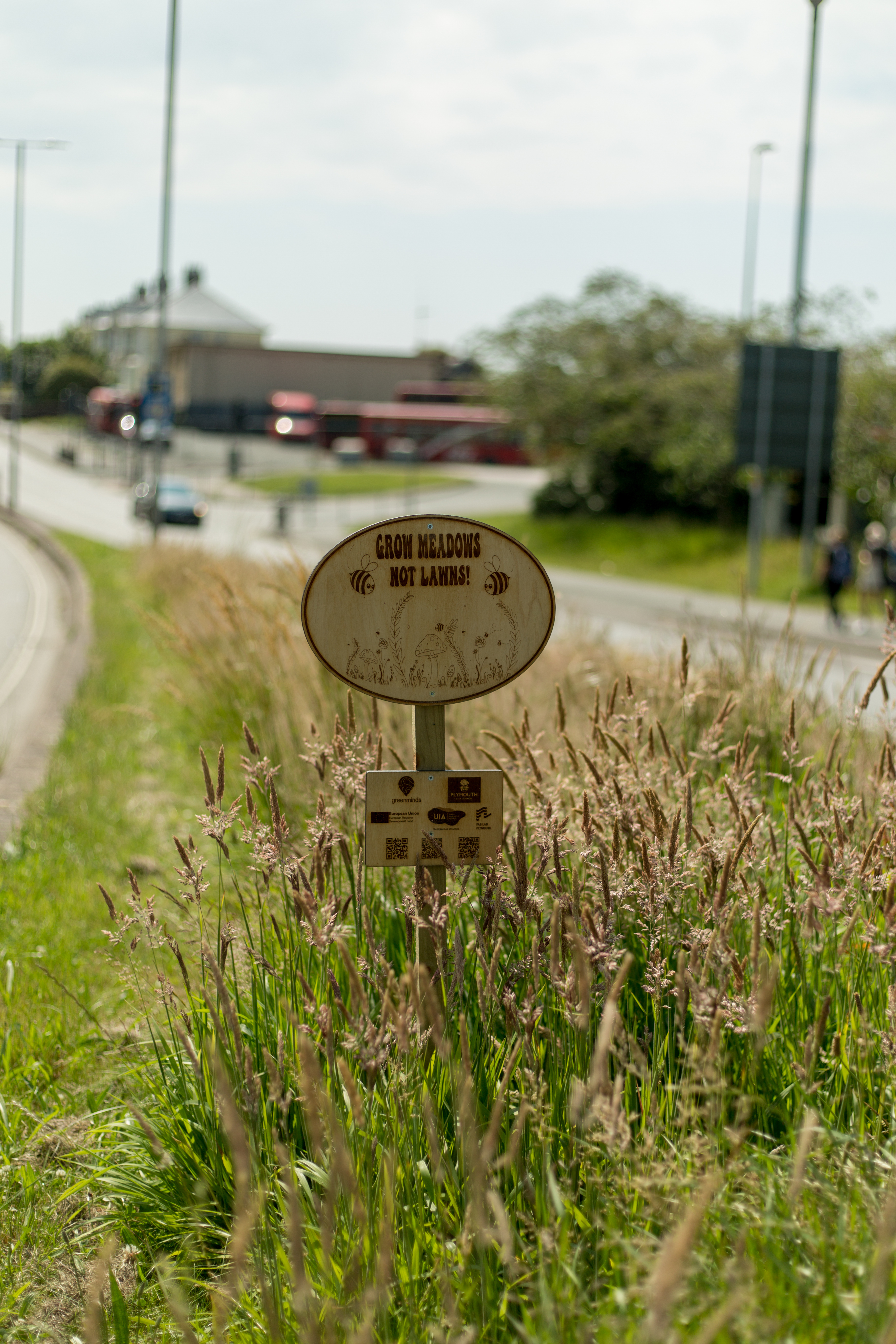
Wildflower meadow sign designed by Eve Newman, first-year UAL Level 3 Extended Diploma Art & Design student at Plymouth College of Art (Photo credit - Ray Goodwin)
Participant Lauren Williams, a first-year UAL Level 3 Extended Diploma in Art & Design student at Plymouth College of Art, draws inspiration from mental health and the natural environment for her artistic practice. Reflecting on the workshop, Lauren said, “I had a particular interest in this workshop because it brought together art and the environment, creating a way to raise awareness of the importance of wildflower meadows.
“I enjoyed the process of collaborating with like-minded people, learning a new digital skill through an easy-to-follow tutorial and communicating ideas with my peers. With the knowledge that our work would go towards educating people on the importance of wildflower meadows for bees, butterflies and other beneficial wildlife, without which our pollinators face a dire future, I knew this would be an amazing project to be a part of.
“If we can all take a step towards making choices that benefit the planet, the wildlife and animals that live on it, then we will move towards a better future - start by checking out Green Minds Plymouth for ways on doing just that!”
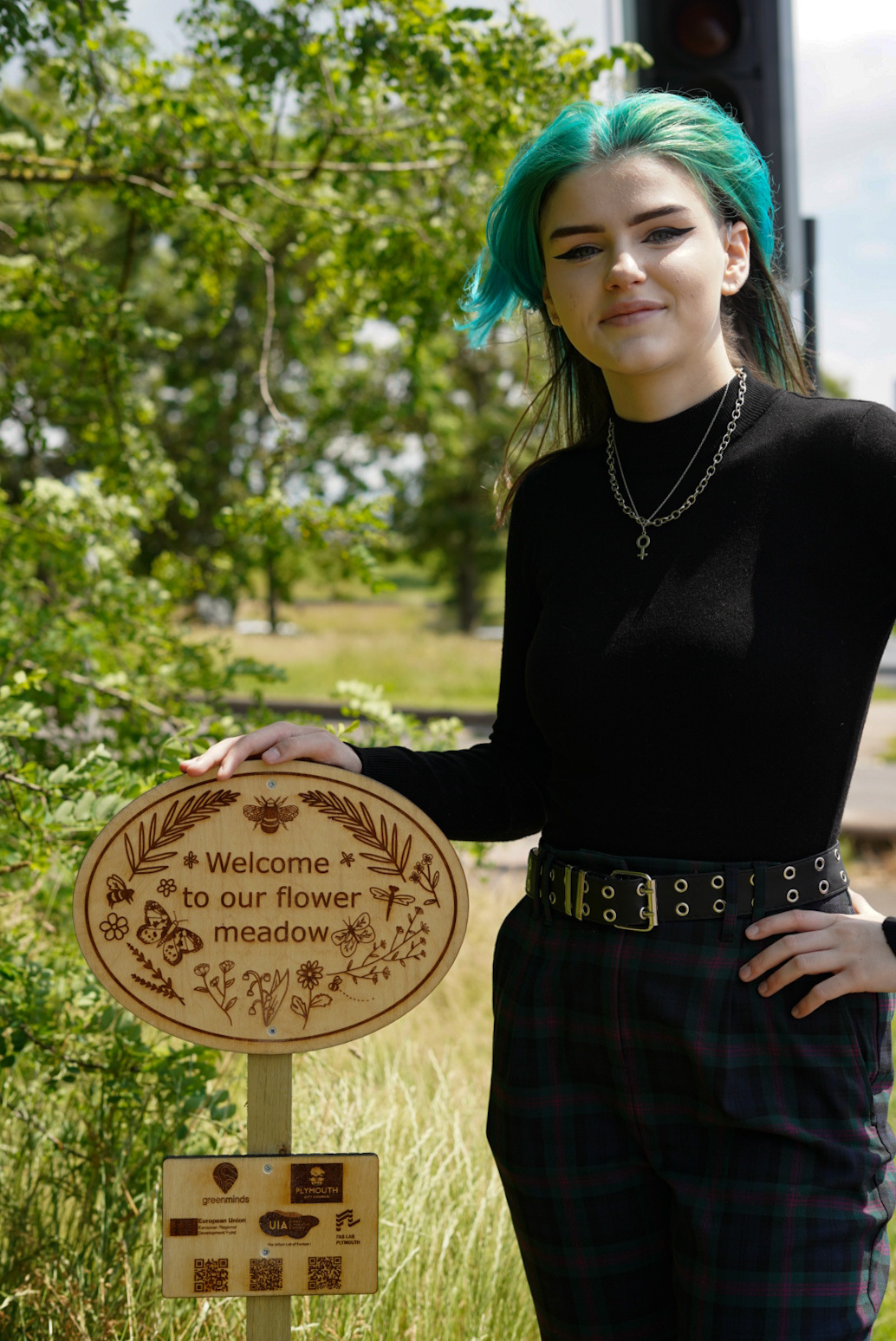
Lauren Williams with her wildflower meadow sign (Photo credit - Paul Williams)
Local projects collaborate to protect nature
The creation of the wildflower signs marks an ongoing collaboration between the Smart Citizens Programme and Green Minds project, utilising the innovative digital resources at Fab Lab Plymouth and supporting digital skills development in the city to protect Plymouth’s green spaces and reveal hidden nature in the city.
Councillor Patrick Nicholson, Deputy Leader of Plymouth City Council, said, “It has been great to work alongside local projects to create these fun signs and show people how beautiful and important these wildflower meadows are - not just for people, but for wildlife, too.
“Each wildflower meadow provides a home for so many plants and insects and now we can share this message with communities across Plymouth”
Since their installation, the wildflower meadow signs have been received with enthusiasm by members of the public, demonstrating a clear engagement with Green Minds’ re-wilding aims. Following this public support, a further 60 signs have been commissioned by Plymouth City Council, which will be laser cut at Fab Lab Plymouth and installed in new locations around the city in Spring 2022.
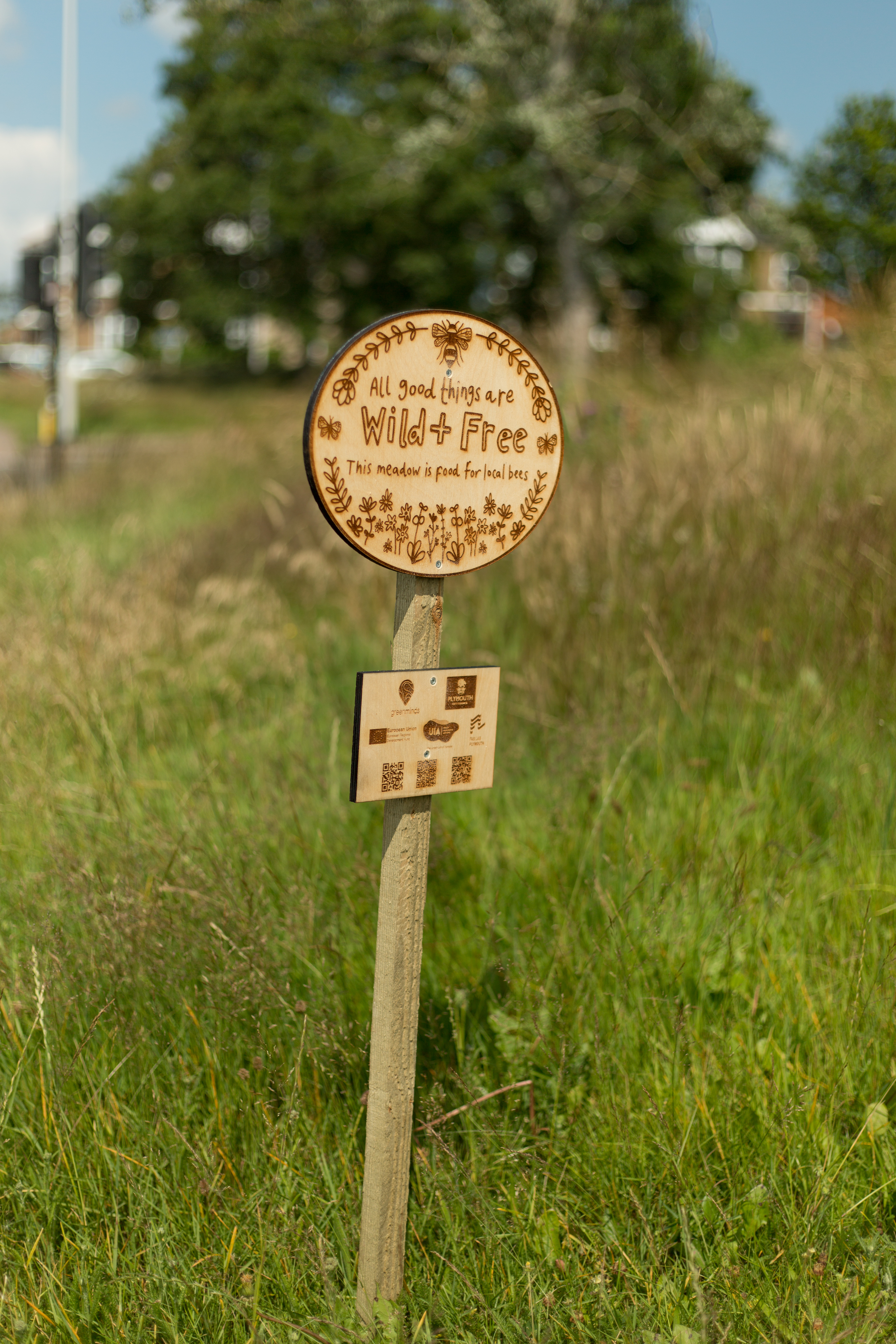
Wildflower meadow sign designed by Genevieve Stewart, second-year BA (Hons) Printed Textile Design & Surface Pattern student at Plymouth College of Art (Photo credit - Ray Goodwin)
Championing sustainable design skills
This workshop joins a number of ‘Nature and Conservation’ themed workshops hosted by the Smart Citizens Programme, which support participants to digitally design and fabricate objects that will benefit wildlife and the environment. Previous events allowed participants to create laser-cut bird houses and assemble Smart Citizen Kit sensors to collect and monitor important environmental data around Plymouth.
In addition to supporting participants to create environmentally-friendly objects, the Smart Citizen Programme also encourages makers to create in more sustainable ways. Connecting local citizens, students, entrepreneurs and businesses with new skills in digital design and fabrication, the programme champions sustainable techniques that are digitally enabled, increasingly local and reduce waste and pollution following the circular economy principles. When designing their signs, participants were introduced to laser cutting, a process that produces minimal waste material.
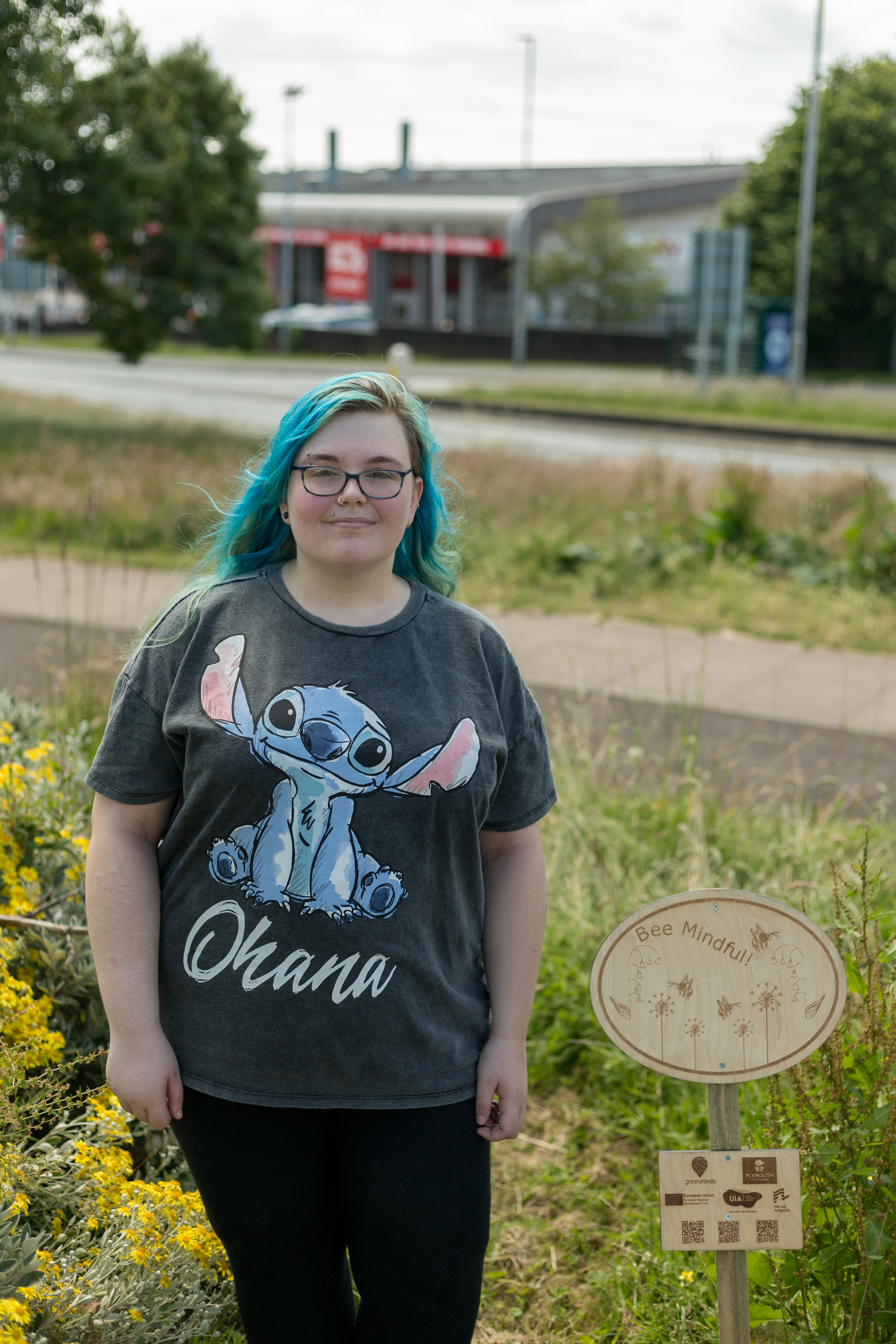
Bethan Price-Nicholls with her wildflower meadow sign (Photo credit - Ray Goodwin)
Bethan Price-Nicholls, a student who recently completed her first year in BA (Hons) Illustration at Plymouth College of Art, said: “I love experimenting with new materials and media. While taking part in the workshop I learnt about the laser cutting process, which I had never seen up close before.
“Laser cutting gives a completely different feel to other mediums that I have used in the past. I found the whole workshop to be an eye opener and it was a vital experience for my creative practice, teaching me that there are still many ways in which I can develop and learn. It has also welcomed me to the possibility of expanding my creative practice and really getting out of my comfort zone to try more new things.”
This activity is part of the iMayflower project and has been supported by The Department for Digital, Culture, Media and Sport, who fund the Cultural Development Fund, which is administered by Arts Council England.
Sustainable Design Talk: WASP Revolutionising sustainable housing through 3D printing using local clay
Italy’s pioneering specialists in 3D printing, WASP (World’s Advanced Saving Project), discussed the latest advances in 3D printing eco-homes at the Smart Citizens Programme’s Sustainable Design Talk, hosted online by Plymouth College of Art’s Smart Citizens Programme and Making Futures Research Group. Members of WASP, who were recently showcased in the World Economic Forum, discussed their new TECLA clay house; the first and unique fully 3D-printed construction based on natural materials and made with multiple 3D printers operating at the same time.
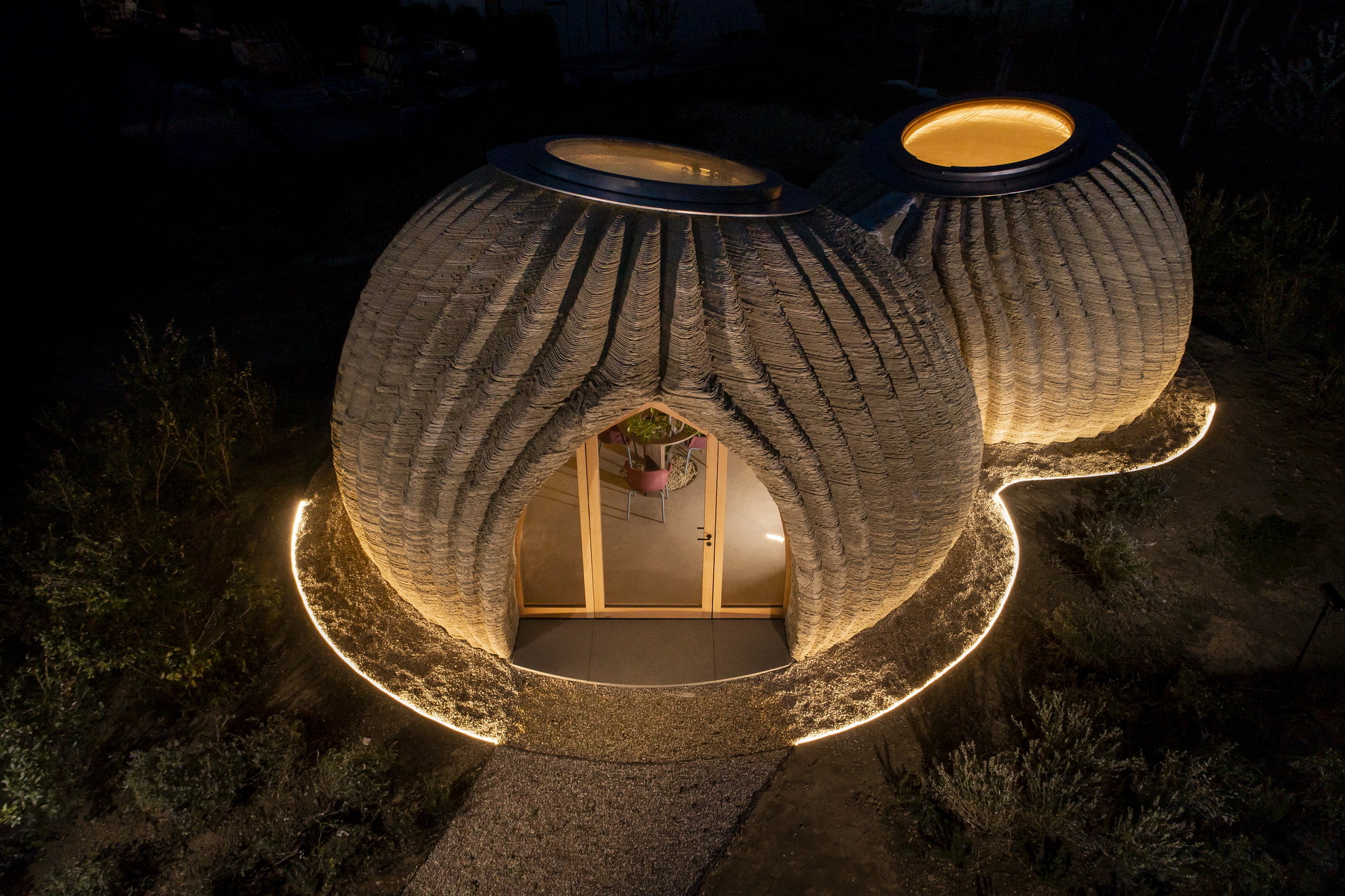
TECLA 3D printed clay house (photo credit - WASP & Mario Cucinella Architects)
The international talk was attended by over fifty representatives from Plymouth-based businesses, as well as students and academics from around the world. Several local participants had also engaged with a number of Smart Citizens projects to date, demonstrating a clear drive within the city to learn more about sustainable design-thinking and innovative approaches to digital design and fabrication.
Lapo Naldoni, building engineer at WASP, led the talk which began by exploring how WASP are tackling housing inequality and the unviable consumption of natural resources through innovative and sustainable 3D printing construction processes, such as their TECLA house (standing for technology and clay). Engineered by WASP and designed by Mario Cucinella Architects, TECLA presents a new circular model of housing: entirely created with reusable and recyclable materials, sourced from local soil, carbon-neutral and adaptable to any climate and context. Through the lens of this project, Lapo discussed how the value of local clay can be amplified by digital design, revolutionising our understanding of sustainable housing.
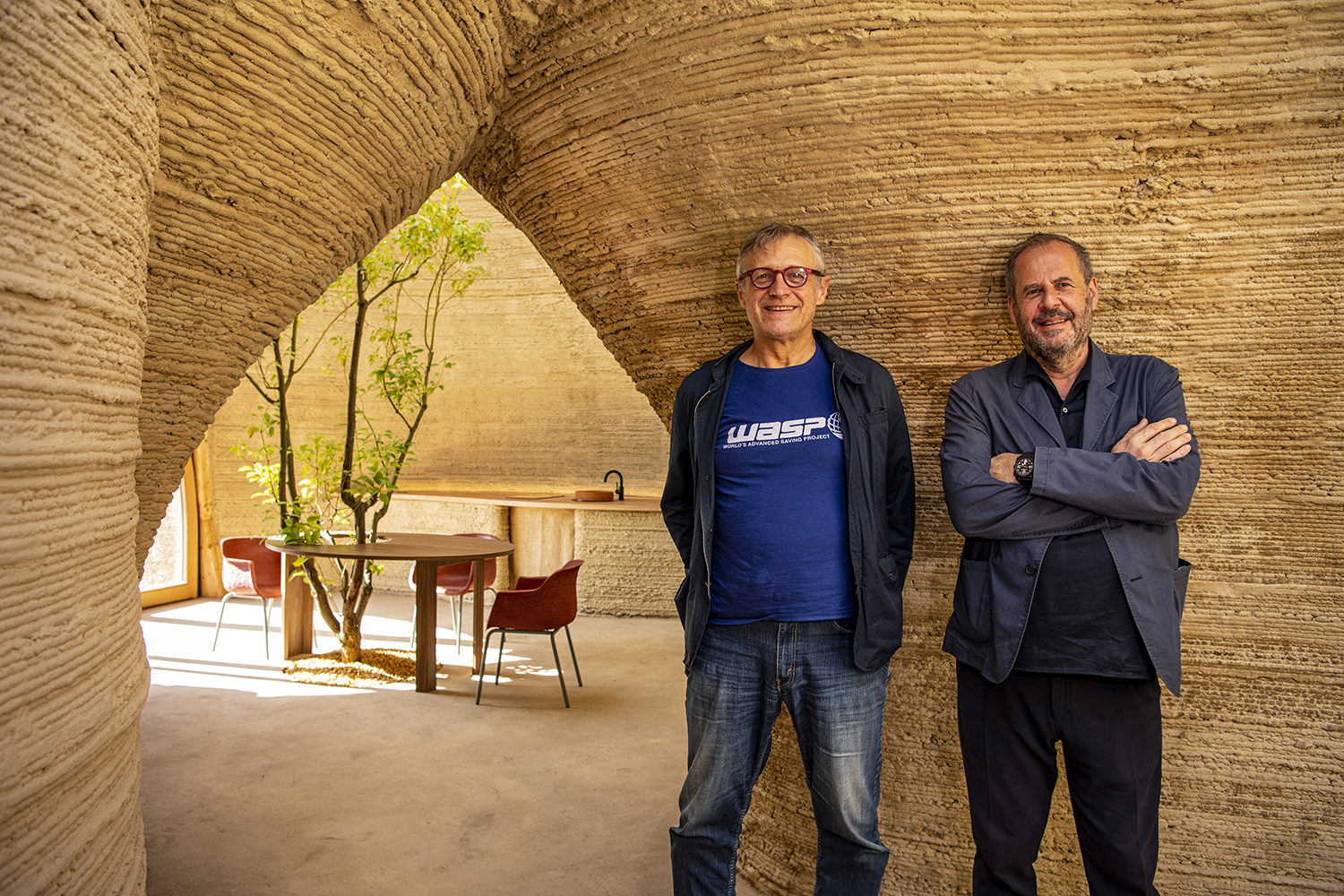
Massimo Moretti, WASP founder, left and Mario Cucinella, architect, right (Photo Credit - WASP & Mario Cucinella Architects)
The talk continued by exploring other projects led by WASP, using their 3D printing capabilities to support innovative design across sectors and disciplines. These projects included: creating orthopedic body braces for medical use, custom face masks, 3D printing with recycled polypropylene as well as working with artists to create public sculpture and installation art.
"From the shapeless earth to the earth as house shaped. Today we have the knowledge to build with no impact in a simple click. Technology is now at the human service and the home as a birthright is real."
— Massimo Moretti, WASP (World's Advanced Saving Project) Founder
Dr Kim Bagley, Lecturer and MA Subject Tutor at Plymouth College of Art, attended the talk. Alongside her own ceramic practice, Kim is currently working on the British Council-funded Craft Futures South Caucasus project, exploring how knowledge is transferred between generations in the rich craft practices of that region and developing vocational education in these countries. Kim is also a member of the Making Futures Research Group and the Making Futures Fellow.
Reflecting on the talk, Kim said, “This was an informative talk on an emerging area of digital technology; it was an absolute pleasure to hear from a true expert in this field. He was generous with his knowledge and experience and the audience was clearly inspired.
“This talk gave me enthusiasm and ideas that I look forward to sharing with my students. As a ceramics lecturer and practitioner it was particularly pertinent to be able to share the true versatility of clay with students.
“It was great to see that one of the young researchers I am working with in the South Caucasus attended the talk too, demonstrating their engagement with global trends. I could not help but imagine the use of WASP’s technology in different locales.”
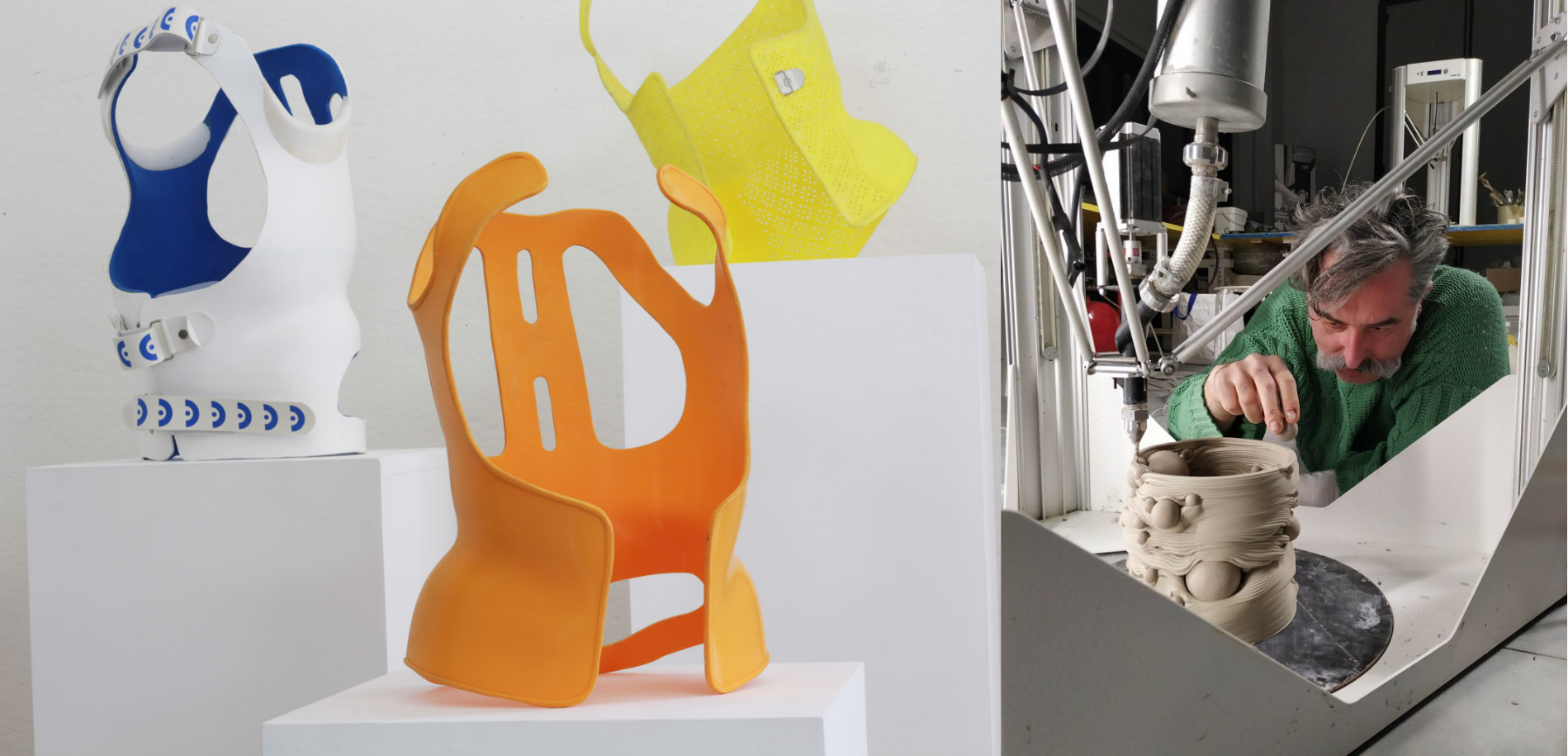
Left: Orthopedic corsets 3D printed in polypropylene by WASP (photo credit - WASP)
Right: 3D printed vase by WASP and Andrea Salvatori (photo credit - WASP)
Plymouth College of Art and WASP in collaboration
Further collaborative opportunities have developed from this talk. WASP, the Smart Citizens Programme and the Making Futures Research Group have begun discussions for a collaborative and student-led research project, exploring ways of 3D printing using local soil and clay from Devon and Cornwall. With a shared impetus towards sustainable design using digital fabrication methods and use of local material, this research will link WASP’s innovative technology with Plymouth, the UK’s first Fab City. As a Fab City, Plymouth aims to produce all the energy, food and products they consume, and to deploy spiral economy strategies for the relocalisation of production, and the technological empowerment of citizens by 2054.
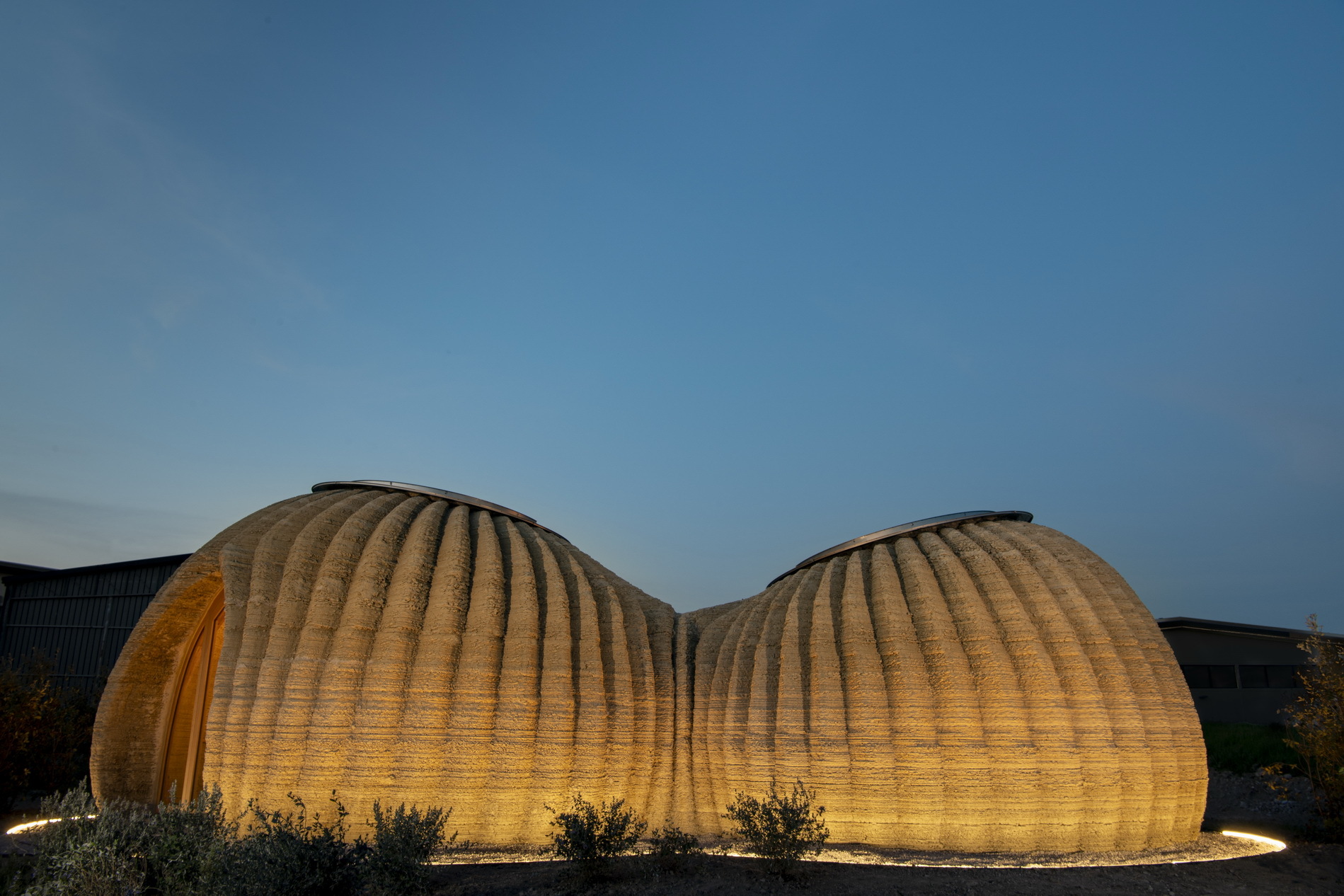
TECLA 3D printed clay house (photo credit - WASP & Mario Cucinella Architects)
The talk was also aligned with Plymouth College of Art’s sustainability agenda supported internally by the ongoing research of its Making Futures Research Group; a collective of Plymouth College of Art’s staff and students across art and design courses focused on understanding the impact of new material technologies on the College’s curriculum and creative practices in contemporary culture.
Starting in autumn 2021, Plymouth College of Art’s curriculum will include a focus on place-based creative pedagogy, which has led the Making Futures Research Group to develop two research projects linking aesthetics, making and geography. The first project, ‘Signature Materialities’, is developing a locally-resourced materials library informed by the history and mineral profile of the southwest coastal region to be used by students in materials-led courses such as BA (Hons) Craft and Material Practices. The second project, ‘Digital Clay’, is focused on analogue-to-digital distributed design methods using clay for 3D printing.
“The WASP talk by Lapo Naldoni on using clay native to his region in Italy was a real inspiration as we shape our intention to bring digital clay and cultural ideas around place together within a global context”, said Stephanie Owens, Head of School, School of Arts + Media and Convener of the Making Futures Research Group who is leading the two projects. “We are eager to continue to work with Lapo and his collaborators at WASP on how we can join together to explore forms of sustainable co-creation across our countries”.
Access a recording of ‘WASP: 3D Printing Eco-Homes Using Local Clay’, on the Smart Citizen’s video channel, alongside other workshops and talks.
This activity is part of the iMayflower project and has been supported by The Department for Digital, Culture, Media and Sport, who fund the Cultural Development Fund, which is administered by Arts Council England.